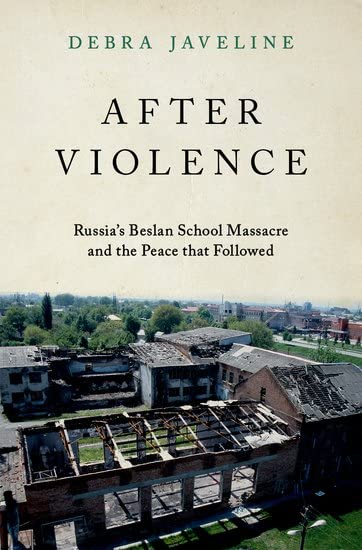
 Kellogg Faculty Fellow Debra Javeline has published a new book with Oxford University Press. After Violence: The Beslan School Massacre and the Peace that Followed was launched with a public event today.
Kellogg Faculty Fellow Debra Javeline has published a new book with Oxford University Press. After Violence: The Beslan School Massacre and the Peace that Followed was launched with a public event today.
The book launch included discussants Russian journalist Maria Lipman and Konstantin Sonin, the John Dewey Distinguished Service Professor at the University of Chicago's Harris School of Public Policy. Kellogg Faculty Fellow Jim McAdams, William M. Scholl Professor of International Affairs in the Department of Political Science, was moderator. The event was cosponsored by the Kellogg Institute for International Studies, the Kroc Institute for International Peace Studies, the Department of Political Science, and the Rooney Center for American Democracy.
Starting on September 1, 2004, and ending 53 hours later, Russia experienced its most appalling act of terrorism in history, the seizure of School No. 1 in Beslan, North Ossetia. Approximately 1,200 children, parents, and teachers were taken hostage, and over 330 – nearly one of every hundred Beslan residents – were killed, hundreds more seriously wounded, and all severely traumatized. After Violence is the first book to analyze the aftermath of such large-scale violence with evidence from almost all direct victims. It explores the motivations behind individual responses to violence.
When does violence fuel greater acceptance of retaliatory violence, and when does violence fuel nonviolent participation in politics? The mass hostage taking was widely predicted to provoke a spiral of retaliatory ethnic violence in the North Caucasus, where the act of terror was embedded in a larger context of ongoing conflict between Ossetians, Ingush, and Chechens. Politicians, journalists, victims, and other local residents asserted that vengeance would come. Instead, the hostage taking triggered unprecedented peaceful political activism on a scale seen nowhere else in Russia. Beslan activists challenged authorities, endured official harassment, and won a historic victory against the Russian state in the European Court of Human Rights.
After Violence provides insights into this unexpected but preferable outcome. Using systematic surveys of 1,098 victims and 2,043 nearby residents, in-depth focus groups, journalistic accounts, investigative reports, NGO reports, and prior scholarly research. The book offers novel findings about the influence of anger, prejudice, alienation, efficacy, and other variables on post-violence behavior.
In his review, Timothy Colton (Harvard University) calls the book an "exhaustively researched and elegantly written study," saying it "draws lessons for broader understandings of life and politics after conflict." Doug McAdam (Stanford University) calls it "illuminating and surprising in equal measure" and "engaged social science at its very best."
The Kellogg Institute for International Studies, part of the Keough School of Global Affairs at the University of Notre Dame, is an interdisciplinary community of scholars and students from across the University and around the globe that promotes research, provides educational opportunities, and builds partnerships throughout the world on the themes of global democracy and integral human development.





